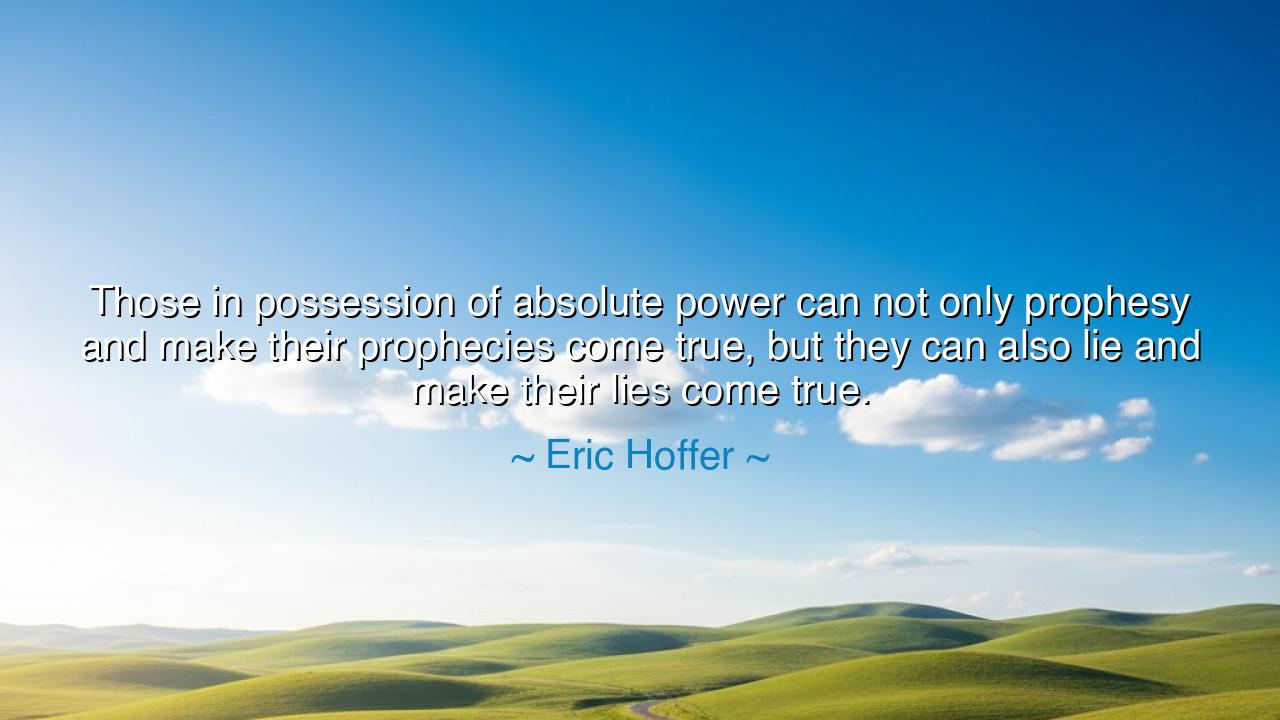
Those in possession of absolute power can not only prophesy and
Those in possession of absolute power can not only prophesy and make their prophecies come true, but they can also lie and make their lies come true.






Hearken, children of the ages, to the piercing words of Eric Hoffer, who proclaimed: “Those in possession of absolute power can not only prophesy and make their prophecies come true, but they can also lie and make their lies come true.” In this utterance lies the eternal truth of authority, influence, and the peril of unchecked dominion. Power, untempered by conscience or law, possesses the frightening ability to shape reality itself, bending the world to the will of those who hold it, whether for truth or deception.
Hoffer teaches that absolute power is a double-edged force. It can fulfill visions and create progress when guided by virtue and wisdom, yet it can also fabricate falsehoods so convincingly that they take root as reality. The potent hand of a ruler, the commanding voice of the few, can bend belief and action, making lies as tangible and feared as truths, and making prophecy as immutable as decree. It is a stark reminder of the moral responsibility inherent in power.
Consider the life of Julius Caesar, whose authority reshaped the Roman Republic. His triumphs and proclamations became reality through the obedience of legions and the awe of citizens; yet the same power could be wielded to silence dissent, exaggerate victories, and shape public perception. Caesar exemplifies Hoffer’s warning: the possession of authority allows a man to transform words into deeds, whether inspired by truth or self-interest.
The ancients themselves understood the duality of power and prophecy. Plato, Aristotle, and the historians of Greece and Rome taught that rulers must be restrained by wisdom and justice, lest the capacity to command become a means of deception rather than service. Hoffer’s reflection echoes through time: those who hold absolute sway over others’ actions and beliefs wield a terrifying potency, capable of making falsehood as tangible as reality itself.
Thus, his counsel is both warning and guidance: to grant power without accountability is to invite the corruption of truth, the distortion of society, and the enslavement of belief to the whims of a single hand. Power must be tempered with scrutiny, transparency, and moral vigilance, for without these, the lies of the mighty may become more formidable than the truths of the wise.
Carry this teaching, children of generations yet unborn: respect the fragility of truth in the presence of authority, question proclamations, and measure deeds against the standards of virtue. For in the realm of absolute power, prophecy and falsehood alike may be forged into reality, and it is the responsibility of the vigilant to discern, resist, and uphold the integrity of life and society.






HNHo Nguyen
This quote feels like both an observation and a warning. It’s frightening how easily human systems can turn falsehoods into ‘truth’ through enforcement, repetition, or fear. Maybe the lesson here is about vigilance — that societies must never allow any person or institution to gain unchecked authority. Once power reaches that level, even reality itself becomes a weapon.
WH
Hello World!
hs=2fe540860355f5c5312b43957I think this quote raises a deep ethical question: if power can make lies come true, does truth even matter in the face of authority? History is full of examples where regimes rewrote facts and convinced people to believe them. But what gives truth its resilience? Is there something inherently indestructible about it, or can it truly be erased through control and repetition?
AKNguyen Ho Anh Khoa
There’s something haunting about this idea — that absolute power isn’t content with controlling people’s actions; it seeks to dominate their perception of truth itself. It makes me wonder if modern technology has made this even easier. With AI, deepfakes, and information control, could we be entering a new era where the powerful don’t just rewrite history, but fabricate reality in real time?
THBao Tran Huynh
I find this statement terrifyingly insightful. It suggests that the danger of power isn’t just oppression but the ability to reshape what people believe is real. Once lies are repeated and institutionalized, they stop being lies in the public mind. Is that why propaganda can be so effective — because it doesn’t just deceive, it *creates* a new version of truth?
TCNguyen Thi Thuy Chau
This quote gives me chills because it reveals how power can distort reality itself. When someone controls both the narrative and the means to enforce it, truth becomes whatever they decide it to be. Do you think this is still relevant in today’s world of media manipulation and political spin? It feels like Hoffer was warning us that absolute authority can manufacture its own version of history.